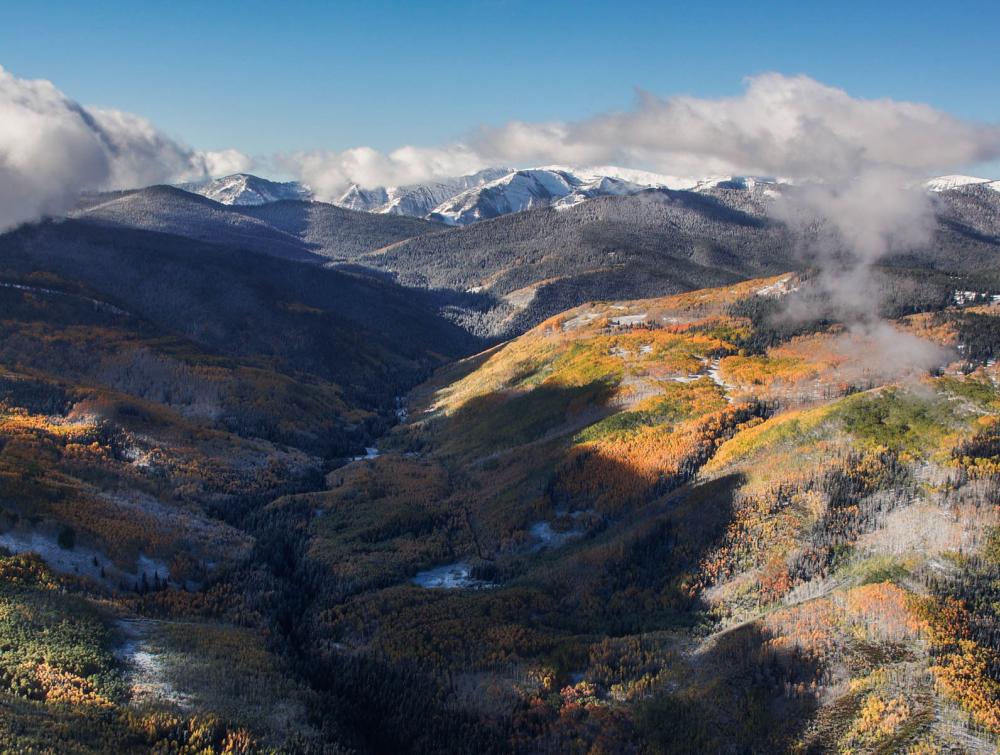Proposed legislation offers a mixed bag for Colorado

Thompson Divide, CO
Ecoflight
Bill would fail to protect Thompson Divide, historic Camp Hale, and the Continental Divide despite overwhelming support
(Denver, CO) – Legislation announced by Representative Scott Tipton today fell short of what wilderness advocates, conservationists, local businesses and numerous county leaders have been calling for to protect some of Colorado’s most treasured recreation, wilderness and historic areas across the state.
The proposed legislation only selects parts of a bill already moving through Congress -- the Colorado Outdoor Recreation & Economy Act -- but fails to include widely supported protections on the western slope and central mountains, and would rollback conservation protections for parts of canyon country in southwestern Colorado by opening wildlands to development and extractive industries. Senator Cory Gardner is expected to introduce companion legislation that aligns with Rep. Tipton’s bill as well.
Representative Tipton and Senator Gardner’s inclusion of protections for San Juan Mountains Wilderness and formal designation of the Curecanti National Recreation Area in the legislation signals a positive sign of support for those communities. However, the legislation fails to include the Thompson Divide and the Continental Divide despite five counties, numerous local governments, and the outdoor recreation industry calling for protection of those lands.
“While Rep. Tipton is beginning to recognize the growing demand from Coloradans to protect places that fuel local economies, provide countless recreation opportunities, and conserve our history and wildlands for future generations, Coloradans deserve more,” said Jim Ramey, Colorado State Director for The Wilderness Society. “It would be great to see Rep. Tipton work across party lines to help support the Colorado Outdoor Recreation & Economy Act that does far more for Colorado.”
Legislation that fails to protect the Thompson Divide, historic Camp Hale, and the Continental Divide is not acceptable. All three of these areas are included in the CORE Act, introduced by Senator Michael Bennet and Congressman Joe Neguse, and co-sponsored by Reps. Ed Perlmutter, Diana DeGette, and Jason Crow.
The primary differences between the CORE Act and the limited bill proposed today are:
-
The omission of protecting new wilderness and special recreation areas along the Continental Divide, including the historic Camp Hale landscape which is critical to honoring and preserving our cultural history and the legacy left by our veterans.
-
The omission of the Thompson Divide region, despite decade-long, bipartisan efforts to protect this landscape from future oil and gas leasing.
-
Eliminating protections for important low-elevation wildlands in southwestern Colorado by opening them up to mining, drilling, and development.
The CORE Act is the result of decades of collaboration between diverse stakeholders, including ranchers, sportsmen, small business owners, veterans, local elected officials, outdoor recreation organizations, and water and energy groups. The legislation is supported by more than 20 counties and municipalities, dozens of conservation and outdoor recreation organizations, and more than 160 businesses across Colorado including Vail Resorts, Osprey Packs, Alpacka Raft, Icelantic Skis, and The North Face.
“The CORE Act has broad support from across Colorado and is already advancing through Congress,” said Ramey. “Constructive ideas from Representative Tipton, and Senator Gardner, and are always welcomed and needed. Unfortunately the proposal shows a lack of responsiveness to constituents who’ve been asking for their help to protect the Thompson Divide and Contiental Divide for the better part of a decade.”
Public opinion research has found that Coloradoans value protected public lands. According to the bipartisan Conservation in the West poll, 96 percent of voters think outdoor recreation is important to our state’s future economy. Additionally, 97 percent of Coloradans believe public lands give the Centennial State an economic advantage over other parts of the country. These sentiments are supported by the fact that in 2017 outdoor recreation contributed $62 billion to Colorado’s economy and $35 billion to the state’s GDP, while supporting 511,000 direct jobs according to Colorado Parks & Wildlife.
CONTACT
- Jim Ramey, The Wilderness Society, 303-957-9183, jim_Ramey@tws.org
- Jennifer Dickson, The Wilderness Society, 303-650-9379, jennifer_dickson@tws.org
The Wilderness Society, founded in 1935, is the leading conservation organization working to protect wilderness and inspire Americans to care for our wild places. With more than one million members and supporters, The Wilderness Society has led the effort to permanently protect 109 million acres of wilderness and to ensure sound management of our shared national lands. www.wilderness.org
